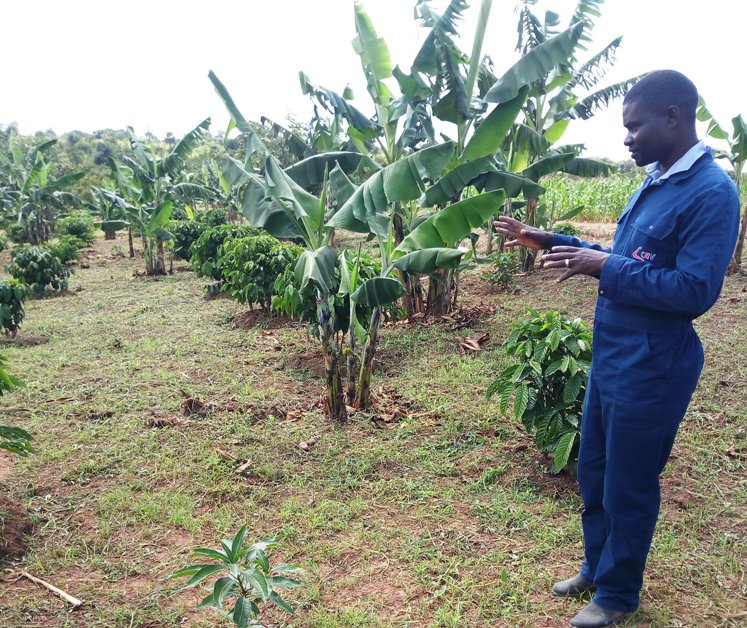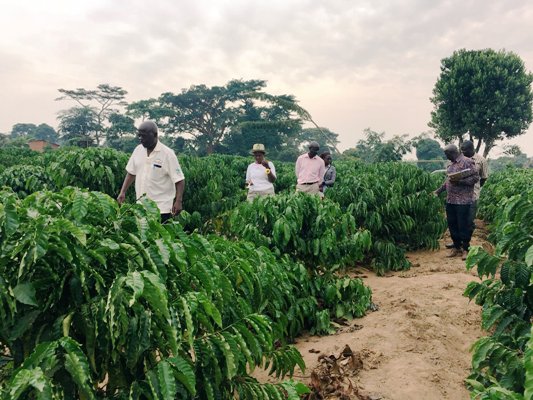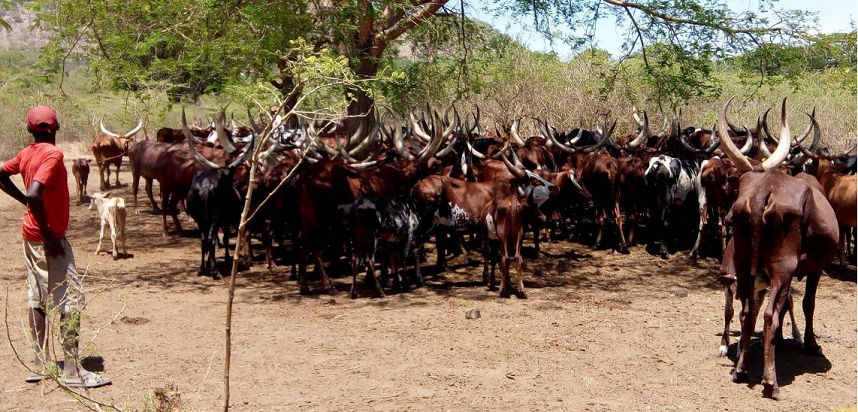Dr. Kidega plans to expand his coffee farm to 30 acres
Northern Uganda has become a new frontier for coffee growing in Uganda.
A few years ago, Uganda Coffee Development Authority (UCDA) introduced commercial coffee production in the non-traditional commercial coffee areas including the Mid-Northern Uganda districts of Apac, Gulu, Kitgum, Lira, Pader, Oyam, Amolatar, Dokolo and Amuru.
Despite skepticism from farmers at the start, some persisted and embraced coffee farming. Today they are reaping the rewards.
Dr. Tonny Kidega, 39, is from Gulu county village, Pakwelo parish, Onyama sub county in Gulu district is one of the model coffee farmers in Northern Uganda.
He owns 40 acres of land. Twenty acres are planned for coffee-growing. On the other 20 acres he grows feeds for his dairy farm and food for domestic consumption.
He is also a dairy farmer. He owns a model farm with 70 Friesian cows and milks 24 cows every day. His main business was dairy farming before he diversified into coffee.
How He started
Dr. Kidega’s interest in growing coffee started when his neighbor Harriet Aber started a coffee nursery. Many people kept coming to his farm to pick manure to put in their coffee gardens.
“I didn’t give it much thought until one day I asked myself whether the manure people were buying from me couldn’t be useful to me too,” he says.
So he talked to Aber. She gave him phone numbers for Uganda Coffee Development Authority and Uganda Export Promotion Board.
She told him that coffee-growing in northern Uganda was a virgin area and worth trying.
However, when she told him that coffee takes three years to start fruiting, Dr. Kidega remained hesitant because he considered three years a long time.
Aber kept sending him statistics on how Uganda’s coffee was performing. Over time, he developed interest in growing coffee.
As a business person, he realized that there was a lot of potential in coffee. One day an Indian visited his farm and collected 10 tonnes of manure to apply in his coffee nursery.
That was his turning point. He was convinced that this was a serious venture to get into. So he took the first step.
Training from UCDA
He invited the UCDA Regional Coffee Extension Officer (RCEO), Winfred Oyella to his farm.
He showed her the land where he wanted to grow coffee and requested to be trained on coffee growing.
Oyella told Dr. Kidega that for one to succeed as a coffee farmer, they need passion, manure, water and land. Fortunately, he had these in plenty. She then trained him on field preparation and planting.
The RCEO told Dr. Kidega to visit a nursery operator where he learnt how to handle the coffee seedlings.
ALSO READ:
Lessons For Farmers From Africa’s Largest Coffee Plantation
How To Earn Over Shs23m From An Acre Of Coffee Annually
He then requested the RCEO for 1,400 seedlings. Dr. Kidega says that he benefited greatly from the training he received from Oyella.
After the training, he was able to dig the proper holes with proper spacing and applied manure and mulch as he had been advised.

Oyella visited the farm regularly and trained the employees that worked on the farm on Good Agricultural Practices (GAPs) for coffee such as how to bend the coffee trees to increase their productivity.
Dr. Kidega notes that Oyella’s frequent visits helped him remain on track and look after his coffee better.
Fighting drought
Dr. Kidega planted his coffee during the onset of rains. He put a small shade around each young plant to protect it from drought stress and the scorching sunshine.
He ring-mulched the coffee to keep the soil around the plant moist. This improved the survivability of his coffee. He also pruned his coffee trees, an activity that was at first difficult for him.
However, immediately after pruning, the trees fruited more. He dug ponds to trap water during the rainy season. He used this water to irrigate the coffee plants during the dry season as he was trained and he had 80% survival rate of the seedlings he planted.
He employs three women to focus specifically on his 20 acre coffee farm. Because of good agricultural practices, his coffee was able to start flowering before 3 years.
UCDA provided him with shade trees called albizia coriaria which he planted in the coffee farm. The farmer also received over 1,000 banana suckers from UCDA, which he planted to act as shade trees as well as provide food for consumption.
He has harvested bananas from these suckers and he has even been able to sell suckers to other farmers for planting.

Dr. Kidega is excited that even before he harvests the coffee, he is earning from the bananas that he inter-cropped with coffee.
This is a motivation to him and his employees. He joined a group of coffee enthusiasts that who give useful tips on coffee which he uses to improve his farm.
He has also integrated his dairy farm with his coffee plantation. He uses the cow dung from his dairy farm as fertilizer for his coffee and this saves him a lot of money on fertilizer.
He has 10 acres of maize. Once he harvests the maize, he uses the stover for mulching the coffee trees. His plan is to increase coffee farm coverage to 30 acres. He also plans to establish a bigger mother garden.
Plans for a coffee factory
Given that there is no coffee processed in the region currently, his plan is to set up a coffee factory. Dr. Kidega has already acquired the land for establishing the coffee factory.
He noted that this will be the first in Gulu and in the region and it will motivate and inspire more people to plant coffee since there is a ready market for it.
He says that his farm has become a learning center and is open to other farmers.
He is ready to have his coffee farm established as a technology demonstration site, because his desire is to have as many farmers as possible grow coffee in the region.
He appreciates the support from UCDA and the constant visits from the UCDA officers although he would like them to be even more frequent.
His request is that UCDA organizes more farmer tours so that upcoming farmers can learn from traditional farmers who have prospered in this field. He also recommends that they join groups where they are able to learn from each other.
“There is need to strengthen monitoring and follow up of farmers to ensure that they follow the right procedures at planting, harvesting and beyond,” he says.
Dr. Kidega is a very ambitious and enthusiastic farmer, who is looking forward to having a hulling factory operating in Northern Uganda.
Credit: UCDA







I am a finalist medical student at Mbarara University . I have the interest in agriculture but more in coffee growing . With the information that Dr.Kidega provided to us , I have even learned some new things from him and I appreciate his efforts and love for venturing into coffee.
It’s really important for the youth to know and learn alot more skills in agriculture as they are still in schools at an earlier age since agriculture is Uganda’s most important activity that avails us with alot of revenue to develop our country .
I am looking forward to meeting Dr.Kidega one day and learn more from him on his farm practically.
May God bless you more 🙏 Amen.
I also have a coffee farm in Masindi. UCDA officers should come and visit my farm as well and offer me advise and assistance where necessary so that we can also encourage coffee farming in Bunyoro region since people there have not paid much attention to growing coffee. Am also planning to put up a coffee factory in Bunyoro to encourage more farmers to grow coffee.so please UCDA, I highly need your assistance.